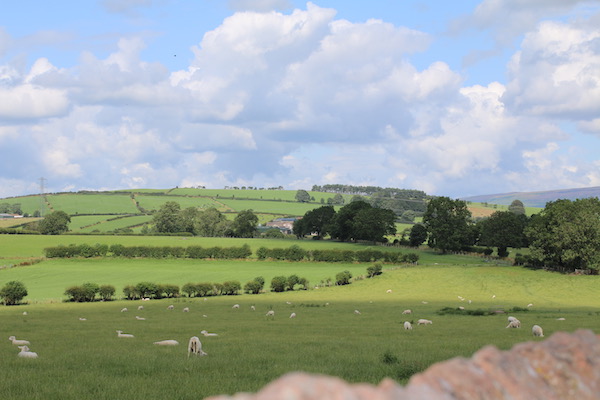‘The Will of the People’ is a slogan/cliché people in 2019 either love or hate, depending on their standpoint on Brexit. But it wasn’t coined in 2016 – and our present constitutional mess is far from the first in British history.
The Will of the People today
There have been extraordinary events lately, with a UK government shutting down Parliament against Parliament’s wishes. For many of those who support Brexit, this is seen as justified in order to push through The Will of the People: the 52% who voted for it in the 2016 referendum.
The word ‘prorogation’ can’t have been in anyone’s lexicon until this summer. But this act has raised serious questions about the whole British constitution.
The prorogation issue is being tested in the UK Supreme Court.
The Will of the People in 1884
Back in 1884, there was another constitutional battle – over who had the right to vote. And the unaccustomed word on the lips of everyone was ‘franchise’.
On the evening of September 3, an open-air meeting was held at High Hesket to protest against the action of the House of Lords in rejecting the Franchise Bill.

The chair was taken by the Rev. J. Arlosh, who was supported by Mr. R. A. Allison, Scaleby Hall ; Mr. Bragg, Southwaite Hall ; the Rev. H. M. Kennedy, Plumpton ; Mr. G. Seatree, Penrith ; Mr. J. Simpson, Romanway, and others.
If that sounds like it was the ‘liberal elite’ (!!) making a fuss, it was a lot wider than that.
There was a good attendance, in great part composed of agricultural labourers, many of whom had walked five, eight, and even ten miles to the meeting, after a hard day’s work in the harvest field.
Among those present were: William Postlethwaite, Wreay; Rickerby, Aiket Gate; Raven (possibly John Raven), Thomas Lowthian, R. Lowthian, T. G. Lowthian, Beaver, and Walker, Plumpton; I. Kirkbride and J. Carruthers, Nun Close ; J. Nixon and J. Monkhouse, Armathwaite ; Murrah, Old Town ; Thomas Slack, T. Murrah, Joseph Meals, Robert Newbold, R Kerr, and John Lewis, Low Hesket ; John Graves, Sewell House ; J Troughear (probably Joseph), High Hesket, and others.

The 1884 Reform Act
The 1884 Reform Act was the third reform to Britain’s system of voting in the Nineteenth Century, and looked to extend voting rights to people in rural areas who had hitherto been excluded.
The House of Commons accepted William Gladstone’s Bill. The Act gave rural counties the same voting rights as municipal boroughs. – If you were a male householder or a man renting unfurnished lodgings to the value of £10 a year, you had the vote.
But the House of Lords, which was dominated by the Conservative Party, tried to block it, worried that giving more working men the vote would go against them.
Those working men at High Hesket: ‘were all well aware that they were met together in this quiet autumn evening in a time of trouble and of danger—danger that their rights as Englishmen might be infringed by the action of the Lords.’
‘The House of Commons represented the people, and that House had declared in loud, unbroken tones that the people wanted the vote…’
Prorogation 2019, the Lords in 1884 – and a king who lost his head
Prorogation of Parliament in 2019 has been compared to King Charles I shutting down Parliament in the 1600s to get his own way
The speaker at the meeting at High Hesket in 1884 also had him in mind:
‘After referring to the old power of veto of the monarch, and to the cost at which Charles the First had attempted to assert it, he said that history was now repeating itself, and the Lords were now trying to do the same thing.
According to the confession of the Conservative Party’s own leaders ‘they hail no higher aim than to spare the selfish interests of a party…’
‘But they were not here to speak of this, they had come to demand the vote—(applause)—
The Will of the People of Hesket in the Forest
Mr. Simpson then moved— “That this meeting of electors and non-electors hereby protests against the action of the House of Lards in rejecting the Franchise Bill, and pledges itself to use all legitimate influence to prevent the decision of the people’s elected representatives from being set at naught by the hereditary chamber.”
Mr Simpson called for the reform of the House of Lords (a topic that also continues in 2019!).
Plumpton’s vicar the Reverend Henry Mortimer Kennedy seconded the motion, with strong words on ‘a useless and pernicious institution like the Peers’.
‘What right had a hundred men to cause all this commotion? They required the lower classes to work for the country, to fight the country’s battles, and to pay the country’s debts and expenses, and yet they would not give them a voice in the country’s affairs. (Loud applause.).
Lowering the tone!
The moral high ground was flattened a bit by farmer Daniel Bragg, of Southwaite Hall, who said the country was benefiting from two epidemics. The second was ‘the contagious political fever’. The first was cholera on ‘the continent’ causing people to go to British holiday resorts instead!
The High Hesket contingent agreed to join a mass demonstration in Carlise on September 6, 1884. There were demonstations in a number of towns and cities that weekend – including some by Conservatives against the Reform.
The Lords eventually passed the Bill. Which of course still didn’t extend the vote to all adult men – and did nothing for women at all.
That phrase
After three years of Brexit-related rows, and as someone who hates clichés, I found the following line from the 1884 High Hesket meeting amusing:
Robert Andrew Allison (Liberal MP for Eskdale) told those gathered that the House of Commons was the House that expressed the will of the people.

